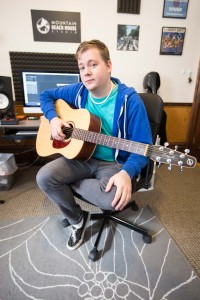
Smaller recording studios are gaining business due to lower equipment prices, a curve in music trends and owner experience. BYU graduates are even busier as they catch onto the recording studio trend.
Mark Carey graduated from BYU last year with a bachelor’s degree in music and an emphasis in sound recording. As a student, he traveled to several countries with the BYU Young Ambassadors group as its sound engineer and mic technician. He also worked as a teaching assistant for BYU, in which capacity he taught students how to use studio equipment, and now holds a job at the Missionary Training Center as an audio/visual technician.
After completing an internship at June Audio, a more well-known Utah County recording studio, he graduated and opened Mountain Beach House Studio in downtown Provo.
Carey has noticed a recent increase in singers and songwriters who have come to his studio. He said he thinks the recent studio trend started in the last 10–15 years as technology advanced and equipment became cheaper.
As recording equipment lower the pricing, small studios have been able to make quality recordings with professional level equipment. This trend has occurred due to the changes in the record label industry.
“With the rise of independent artists, caused by the rise of the Internet and social media, you can gain fans and get noticed without the aid of a large record label deal,” Carey said. “Those artists are now more willing to record at a smaller local studio.”
Celadora Studios owner Eric Thayne said that as new performance venues are becoming more available, more bands and solo musicians want to get recognized — pushing them to find quality recording studios.
“There is more demand for recording time, and a lot of new bands can’t afford expensive studios, so a lot of smaller studios are starting to fill that market,” Thayne said.
Celadora Studios has a narrow focus on the YouTube market. Thayne said that since YouTube has become more popular, the interest and demand for music videos have increased, making Thayne’s studio business gain popularity and credibility. Thayne said his studio has accumulated a few YouTube celebrities, which helps advertise his studio’s name.
“Recently, we’ve been working with YouTube music celebrities like Tiffany Alvord and Madilyn Bailey and local musicians like Mimi Knowles, Ashley Hess, David Osmond, Amber Lynn and Maddie Wilson,” Thayne said.
Ron Saltmarsh, BYU professor of commercial music, said the recent trend is attributed to the education, skills and experience of the studio recorder, not just the technology.
“Technology is always advancing, and the costs are coming down, but I am seeing more educated and more prepared individuals that are launching studios,” Saltmarsh said.
He said successful studios are run by people trained to use the equipment, who know how to operate with advancing technology and who have learned successful recording techniques from mentors. Anyone can buy the equipment, but not everyone has the skillset or experience to work it.
Saltmarsh believes BYU does a good job preparing students who want to open their own studios. He said BYU gives them the opportunity to experiment with the fundamentals and their own creativity.
“We have worked really hard on getting the students up to speed on what is the current technology,” he said.
Steven Newman and Mike McClellan are BYU grads and owners of Velvet Echo Studios in Provo. They have also caught onto the trend and attribute it to cheaper technology prices. Both believed BYU helped them learn what they needed to know to run a successful recording studio.
“The experiences I had in the commercial music program at BYU made it clear to me that it (opening a recording studio) was something that I needed to do, and I am grateful for inspired educators,” Newman said.
“The joint venture between Steve and I started right after I graduated from BYU’s commercial music program,” McClellan said. It was the best idea ever to go into it together. Two heads are better than one.”
Although smaller recording studios have been more successful when starting up, money continues to be a worry. The price of opening a studio can be manageable, but staying in business depends on income. Carey advised that those who are starting their own recording studios keep their day jobs to ensure financial security until their business gets more recognition.
“If you have a job that pays the bills, then you can start off small and build your studio until you get enough work that you can quit your day job,” Carey said. “It relieves stress and allows you to be more creative and flexible with what you do with your studio.”




